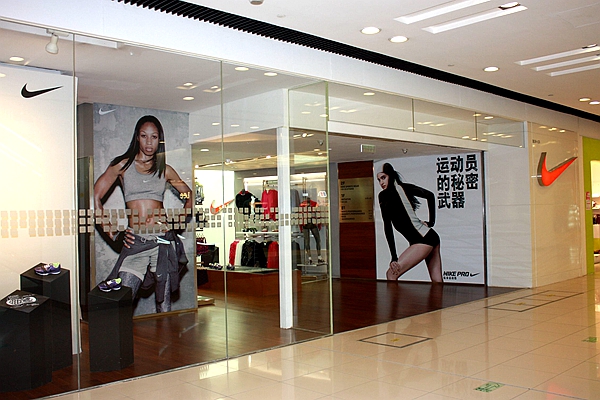'3.15' TV show punctures Nike's air cushion claims
 0 Comment(s)
0 Comment(s) Print
Print E-mail Shanghai Daily, March 16, 2017
E-mail Shanghai Daily, March 16, 2017
|
|
|
A file photo of a Nike store front in Beijing. [File photo] |
Nike China was accused of false promotion and two companies, including Muji, of selling food that could be contaminated with radiation during China Central Television's annual "3.15" quality investigation program last night.
Nike basketball shoes — Nike Hyperdunk 08 FTB — were found to be of lower quality than advertised, the program reported. The shoes, sold as a limited edition, did not incorporate the patented Zoom air cushion, as the sportswear manufacturing giant had said on its Chinese website, the program said.
A customer in Nanjing, capital of east China's Jiangsu Province, bought two pairs of the shoes, which were advertised as copies of those worn by basketball legend Kobe Bryant when he won at the Beijing Olympic Games in 2008. The customer, surnamed Lang, paid 1,499 yuan (US$220) per pair at Nike's Huaihai Road M. store in Shanghai.
"The shoe is expensive and it is considered Nike's best basketball shoe," Lang said.
However, he found something wrong when he put them on.
"The shoes were very hard and I felt very uncomfortable when I fell on the ground while playing basketball," he said.
Lang cut open the heel of one of the shoes and found there was no air cushion, the program reported.
More than 60 disappointed buyers formed a group to negotiate with Nike. Its staff are said to have admitted the shoes had no air cushion and agreed to offer a full refund.
However, Lang and the other customers demanded compensation at three times the price of the shoes under the terms of China's consumer rights protection law.
In February, Lang went to the Huaihai Road M. store where he was told he could get a full refund and a discount on another product. But he rejected the offer and insisted on triple compensation as specified under the law.
The market watchdog in Shanghai's Yangpu District, where Nike China is located, said it had begun an investigation.
Yu Bing, its deputy director, said it was questioning the legal affairs director of Nike China and had ordered Nike China to provide advertisement promotion materials, sales and manufacturing figures, the names of the cities in China where the shoes had been sold and information on whether Nike had received relevant complaints and how it had handled these complaints."
After the program aired, Nike China admitted there had been a mistake in the description of the air cushion.
"We apologize for the inconvenience caused and have been actively communicating with consumers over the problem," it said.
It promised a full refund for consumers who had purchased the shoes.
During last night's program, Peter Zhang, an after-sales service manager at Nike China, admitted there were no air cushions in the shoes. He said mistakes had been made in describing the product and they had been recalled. He denied it had been a case of deliberate false promotion.
However, He Shan, director of the China Consumer Rights Protection Law Research Association, said: "It is a pure false promotion and fraud because Nike is cheating consumers."
In 2011, Nike was fined 4.87 million yuan by Beijing's market watchdog after its Zoom Hyperdunk 2011 shoes were found to have only one air cushion in each shoe instead of the two as advertised.
The same shoes sold in the United States and Taiwan were equipped with two air cushions.
Nike China apologized for misleading advertising and offered refunds, Xinhua news agency reported. The Beijing Administration for Industry and Commerce said Nike had been guilty of double standards, selling inferior products on the mainland but not in other markets.
In another case exposed in last night's CCTV program, it was claimed that Muji stores in China were selling food items imported from areas around Fukushima in Japan in contravention of a ban by the General Administration of Quality Supervision, Inspection and Quarantine.
The Shenzhen Haitun Cross-Border Science and Technology Co Ltd, which supplies imported maternal and infant products to e-business shopping sites, was also found to be selling oatmeal from banned areas in Japan on its website.
The administration bans the import of food items from 10 prefectures in Japan because of radiation concerns following the Fukushima Dai-ichi nuclear disaster in 2011.







Go to Forum >>0 Comment(s)